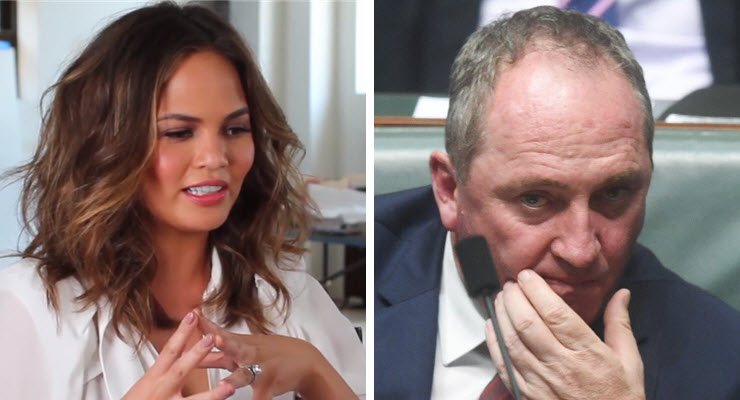
The return of Barnaby Joyce begs the question: what would it take for a politician to be irrevocably cancelled? While sexual harassment allegations and the scandal surrounding his marital breakdown were enough to see Joyce relegated to the backbench for a few years, almost as swiftly as he fell from grace he has returned to lead the Nationals and be the deputy prime minister.
If allegations of sexual harassment aren’t enough, perhaps repeated lying would see a politician permanently cancelled? The ABC’s Australia Talks survey revealed Australians overwhelmingly think politicians caught in a lie should resign, and yet, as Crikey detailed, leaders including Scott Morrison lie frequently and suffer limited consequences. The ABC’s survey also found that Australians have very little faith in politicians to tell the truth and do the right thing.
It’s as if Australians wish lying politicians would resign but know that in reality such accountability would result in empty chambers of parliament. Taking accountability is inconvenient, and those who hold enough political capital have realised the public is willing to overlook their indiscretions if they are “redeemable” in other ways.
The court of Twitter opinion is nowhere near as forgiving, however.
When it comes to cancel culture, it seems that celebrities are held to a higher standard than elected representatives. Celebrity cookbook author Chrissy Teigen, previously known for standing up against social media bullying, was recently cancelled for a throng of old tweets that exposed her as a former bully herself.
While there is no defence for the horrific comments she made, nor the hypocrisy they exposed, it is interesting to see the public relish in the take down of a (mostly) harmless celebrity. Teigen offered a number of apologies while losing millions of dollars in endorsement deals, while for comparably “cancellable” offences, politicians are increasingly refusing to take responsibility, seeing them keep their jobs and even being reelected or promoted.
The key difference between celebrities and politicians in this circumstance is where they derive their power and influence. The Chrissy Teigens of the world rely on brand deals and the constant approval of the fickle online mob, whereas for Joyce it’s the eternal support of his loyal New England constituents (and 11 out of 21 votes in the National Party room to secure one of the most powerful jobs in the country).
The former is based far more on whims and momentary public sentiment. The latter is more forgiving; it allows for other factors to redeem you, and enough delay for public outrage to dissipate.
Despite the forces that saw him ousted, Joyce was resurrected due to the party room’s preference. His access to power does not rely on adoration of the masses, only that of his party’s base. For Gladys Berejiklian, public approval of her handling of the pandemic was the ticket to escaping cancellation amid the revelation of her relationship with disgraced MP Daryl Maguire. This misstep was spun as a personal misfortune and quickly forgiven, as it became clear Berejiklian is too popular to roll.
Celebrities must constantly navigate the precarious twists and turns of popular opinion, and risk losing it all for putting a toe out of line. Meanwhile, politicians are more resilient than ever, batting down scandals left and right and still performing well in the polls at the end of the week.
Whether it’s the pandemic incumbency advantage that has emboldened them, or part of a larger trend in refusing accountability, it’s certainly a worrying state of affairs when we expect a higher moral code from random celebrities than those chosen to lead and represent us.
The solution to this dilemma is unclear. Cancel culture represents its own insidious and destructive force. The drivers of cancel culture — social media and the 24-hour news cycle (which together ensure coverage of every misstep) — are the same factors that have emboldened politicians to deflect accountability. The news quickly moves on to the next thing, and consumers become desensitised to scandal.
Ultimately, only the voters have the power to definitively cancel a politician, and maybe voters just don’t value ethical fortitude in politicians as much as online trolls and big brands seem to in celebrities.
Perhaps politicians have become so far detached from respectability and morality that we simply expect nothing less.
Josefine Ganko is a final year law and public policy student at the ANU and a former editor at Woroni.








The other difference between the two is the depth of the gene pool. A celebrity like Teigan can be swept from the scene by the fickle mob’s whim, and replaced with an equally photogenic, almost duplicate, equally vacuous celebrity. When your only alternative to Barnaby Joyce is David Litleproud, you really are being robbed of choice.
‘Joyce’s return proves that politicians are immune to cancel culture. But why’?
As a ‘final year law and public policy student’, I’m surprised the writer has not stumbled upon the not insignificant fact that we choose our representatives, democratically, by voting at elections.
Twitter, and social media more generally, has not as yet, usurped that function, but not through lack of trying.
Actually it is an insignificant fact given that the Murdoch and Costello Nine propaganda usurps so called democracy, along with a less than capable AEC, the compromised Coalition’s pet force the AFP and the nodding ADF GG conduit
More than 18,000 people have been asked to explain why they apparently voted more than once at the federal election.
NSW, the most populous state, recorded 6760 instances of apparent multiple voting, compared with 4800 in Victoria and 2792 in Queensland.
The Northern Territory recorded the fewest instances with 178.
Despite nearly 8000 cases of suspected voting fraud at the 2013 federal election, not a single person was prosecuted for multiple voting – including those who admitted to casting more than one ballot.
Of the 7743 suspect cases referred to the Australian Federal Police that year, just 65 were investigated and none progressed to a conviction.
https://www.smh.com.au/politics/federal/more-than-18000-people-asked-to-explain-why-they-voted-twice-at-election-20161019-gs5cal.html
The Commonwealth Electoral Act allows for fines of $10,800 or up to a year in jail for people convicted of multiple votes. Anyone found to have impersonated someone else at the ballot box faces up to six months in jail or a fine of $1800.
Before this year’s election the AEC wrote to more than 4600 people with a prior history of apparent multiple voting to remind them of the law.
Mr Rogers said individuals who had two or more marks next to their name at the past two elections were sent warning letters.
FFS it’s useless the AEC
Without CCTV or a sworn witness, multiple voting is impossible to prove.
Perhaps the indelible inked thumb might help?
Australians sure are very accommodating of serial liars, bigots, racists, incompetence, unethical behaviour, corruption, nepotism, misogyny and worse. Disregard for basic democratic principles and contempt for democratic institutions don’t fase them and they are obviously more than ok with the total lack of good manners some members of parliament display and just plain good old courtesy. The way conservative politicians routinely talk over their interlocutors is something one would expect parents to teach their children not to do.
But this generosity is only directed at the side of politics one supports. Those opposite should not expect the same leniency. They will be tarred and feathered for the tiniest of transgressions.
Corruption is even more about the revolving door between politics and lobbying than it is about gifts to politicians. Political immunity feeds corruption. It also corrupts our entire future.
A payment not with a briefcase containing a million dollars, but a job upon retirement that pays a million (especially since the Retirement Allowance will probably be paid in full anyway) is often worth much more than a cash payment and certainly more than a free lunch, even one worth $500 a head.
Only the beneficiary will claim not to believe that a business or wealthy individual is buying them for access, or favours, and not for the pleasure of their company. When a decision maker expects to be later employed for an exceptional wage, or gifts to the value of, they will certainly be positively biased towards their intending benefactors.
Tolerating their contempt for us rewards us with corrupted decision-making, lost opportunities, massive social stress, and perverted bureaucracies.
..”the respected Veterans’ Affairs minister Darren Chester… told ABC TV that the conversation he had with Joyce when the new leader called to sack him was “so incoherent” that he “couldn’t actually explain what he was even saying to me”.
Chester was replaced in cabinet by Andrew Gee, who backed Joyce on a promise of promotion following an undistinguished stint in the junior ministry.”…TSP
Why?
Because it’s all about power, not about good governance or what is in the best interests of ALL Australians